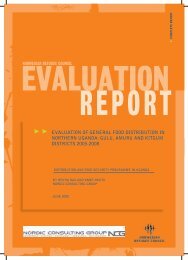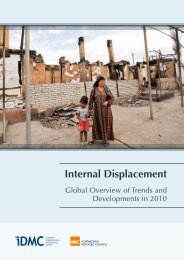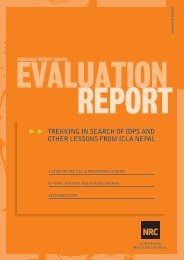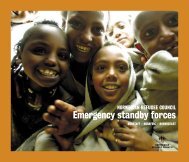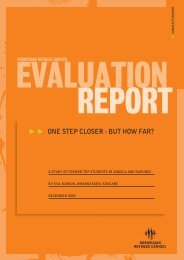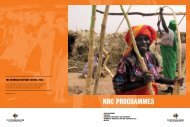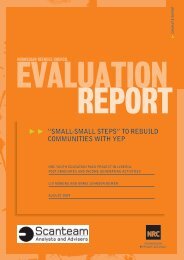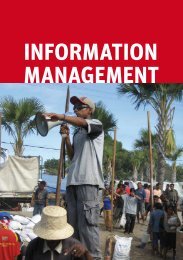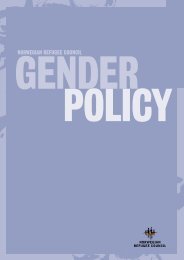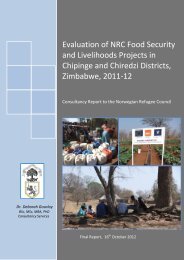Download report here - Norwegian Refugee Council
Download report here - Norwegian Refugee Council
Download report here - Norwegian Refugee Council
- No tags were found...
You also want an ePaper? Increase the reach of your titles
YUMPU automatically turns print PDFs into web optimized ePapers that Google loves.
With regard to the implementation of UN SCR 1325 (inclusion of womeninto peace processes) and the enhancement of gender sensitivity intomediation processes, the relevance of the SBT is mixed. Both teams hadsubstantial gender expertise (the team leader in the first team and thegender expert in the second team both offered advice on gender-relatedissues on several occasions). Most of the SBT, however, did not feelconfident enough to use their knowledge in a more pro-active way nor didthe field missions request gender-related advice from the mediationexperts.MSU has developed a training module for the SBT induction week and isactive in developing a conceptual framework on gender and mediation inco-operation with UNIFEM (now UN Women). In addition, it is expectedthat the number of women in the SBT will also increase (one woman in thefirst, two in the second team); the third team will also have a gender expertwho will serve as a thematic focal point as well as resource for internalmainstreaming.Effectiveness of theMSU SBTThe SBT was assessed in terms of its effectiveness by taking into accountthe direct outcomes of the mediation support activities. These recordshave been largely encouraging but also include some critical lessonslearned. As one prime example, the deployment of an expert to Kosovo in2008, who initiated negotiations for a political dialogue between theSerbian and the Kosovar governments, paved the way to the downsizing ofthe UNMIK from 4,000 to 500 people and a takeover of responsibilities byEULEX. An overview of deployment cases clearly showed that the SBTcould provide for effective mediation support. Often, the right expertise wason the spot at the right time.In some cases, deployments were not effective. Most often this was due toa lack of adequate logistics, unclear terms of reference and lack ofunderstanding (or even trust) from the field mission or, indeed, the wrongchemistry of a standby team member with other UN staff. The interfacemanagement between the mission and the external expert is pivotal to theeffective deployment of the SBT. This has improved considerably since itsfirst year of operation as deployment procedures are more systematisedand knowledge about the SBT is spread within the UN system.Personality matters. In some cases, the most effective advice is providedby a solid and modest advisor who works behind the scene with the fieldmissions and within given TORs. In other cases, a strong personality with abroad skills-set is needed which is able to capture the opportunities of themoment. An effective SBT, t<strong>here</strong>fore, needs not only a diversity of regionaland thematic background and gender-balance but also a set of diversecharacters and egos. Substantial process and mediation skills are a mustfor every SBT member. These personalities need a framework in whichtheir strengths are maximised and potential risks are minimised. To thisend, a code of conduct for the SBT members, especially for those whohave not been previously exposed to mediation processes, would be ofbenefit.Efficiency of theMSU SBTThe efficiency of the SBT team in terms of value for money or input versusresults has been assessed in a both quantitative and qualitative way. It isimportant to consider that a meaningful contribution to one peace processcould lead to enormous savings not only in financial terms but also in termsof the human costs of conflict.The initial benchmark of a deployment rate of 75% created a considerableamount of pressure for the MSU and the NRC. W<strong>here</strong>as the averageiii




